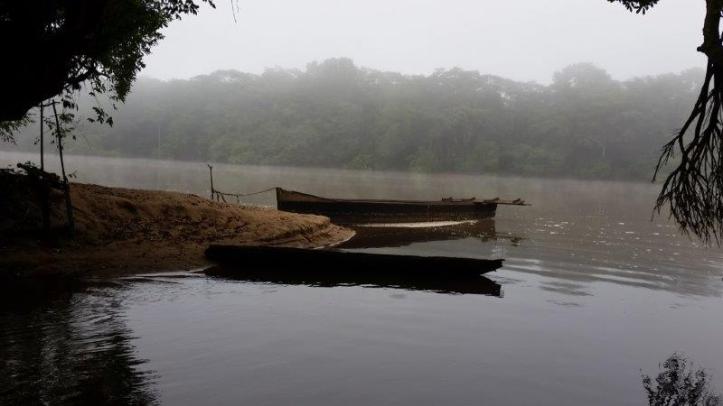The Sangha river eddies and swirls as it passes the lodge, and so too do languages around here. While the Central African Republic has two national languages, the widely-spoken African creole-style language Sangho along with French, here at any one time there are rarely less than 5 languages flowing and eddying across the grounds.
For me French has been less of a struggle than I feared. Its in large part due to kind tolerance by locals here of the imperfect utterances I hear issuing from my mouth in some tortured rendition of a beautiful language: ‘Oh whoops’, I said to myself one morning recently too late after another encounter, ‘Avez- vous faim NOT Etes-vous faim?’. Yet I will give myself some credit too: over the weeks, vocabulary learnt in a long-distant school era has word by word bubbled up through my mind and out in my speech. Its as if a precious treasure of French vocabulary is being released by tiny inner scuba divers uncovering long-hidden words buried deep in the seabed of my consciousness. I’m beginning to think and talk to myself in this gorgeous language. Vraiment.
Sangho too is a fine language, full of nuanced descriptions such as ‘nguti dzapa’ – the water of God – for what the English call plain old ‘rain’. With the same word order as English but much less grammar, even I now have a conversational fluency of greetings and discussing upcoming weather. I’ll continue to stick to French though when it comes to discussions on more challenging topics such as accounting or menu planning with the chef. It is unlikely my Sangho will get much further during my final three weeks here, but it’ll be better than my ability with local languages that’s for sure.
With a staff made up from two ethnic groups, BaAka(Pygmy) and Bantu, I am able to detect but not make sense of messages and languages being exchanged, repeated, mixed and translated. BaAka have their own language (‘BaAka’) and while most speak Sangho, only a few have had the school education for French (or indeed to read and write) so with many of them I must rely on another staff member to translate. All the Bantu speak excellent French, perfect Sangho and some a little English too so they help me out, and there is little hope of me conversing withthem in their own tongue. With three Bantu tribes in this area, that means three different mother tongues even just amongst Bantu staff born locally: Sangha-Sangha, Baya or Mbimo. Of course some Bantu staff have arrived from other areas or married out-of-towners adding extra languages to the mix.
‘What language,’ I asked Armand, one of only two Bantu lodge staff able to speak to the BaAka workers in their own language, ‘Do you and your family speak at home?” “Well,” he explained to me in his kindly slowed-down French, “My wife is Bogongo and I am from Ngombe, so at home we generally use French, Mbimo, Sangho, Bogongo and Ngombe, depending on the subject under discussion. Often we mix all of them within one sentence.” Phew, sounds tricky to me!
My small contribution to this linguistic soup is to start English classes. While the lodge owners here are South African, their communication with staff before their departure used an unusual-but-pragmatic French/English creole. It wasn’t until after Rod and Tam’s departure that I learnt that some of the staff speak some English and are keen to practice and learn more. So that’s what we are doing!
Richard my 23 year-old British Kenyan co-volunteer muddles through in English with an increasing number of French words thrown in as he learns them, but still the hard-boiled eggs for the pangolin that he requested from Sympho our chef this week turned into an unexpected delivery of an omelette. (It took him a while to work out why he was receiving this unanticipated breakfast though like most active young men he’s not one to turn away good food.) So while Richard word-by-word painstakingly adds to his French vocabulary, Sympho is extending his English. Most of the guests that come to the lodge are anglophone so most (but not all) staff see proficiency in English as of definite value. The informal English class is a lot of fun. For Blaise on the housekeeping staff, already fluent in 9 other languages (parental tongues of Koko and Pandi, Lingala from neighbouring Congo, local Baya, Sangha-Sangha, and Mbimo, Sangho and French along with some BaAka), mastery of English, the tenth language, will he tells me be enough!
Anyway as you can imagine, with linguists like these in the class, this English language teacher frequently struggles to keep ahead! Which is why that’s all from me for now. Until tomorrow/a demain /na kekereke : I’m off to prepare another session of practical English…


Jane – thanks for your blog – fascinating. You are quite amazing! And here I am thinking you might be in Scotland this May!
LikeLike
Well I am still really keen to come to Scotland and do some cycling – its definitely high on the list – but may have to be next year. Actually I so wish I had my bike here…
LikeLike
Sounds good. I recently bought a new bike and am enjoying cycling in north east Fife where we moved to in January. There are still a lots of hills here, but then this is Scotland!
LikeLike